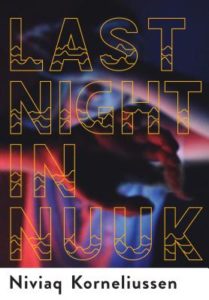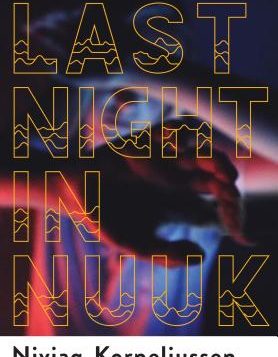 Last Night in Nuuk
Last Night in Nuuk
by Niviaq Korneliussen
Translated by Anna Halager
Grove Press, Black Cat. 288 pages, $16.
BASED ON the age of its characters, Last Night in Nuuk falls squarely in the New Adult market, and the novel closely aligns with current trends in that genre. In first-person, present-tense narration, the novel closely focuses on the chaotic inner lives of five young characters who are trying to make sense of the adult world they’re entering in their native country of Greenland.
Because the lens is focused so tightly on their thoughts and feelings, you won’t learn much about Greenland from this novel. With the long, dark night as a backdrop, these young, angst-ridden characters could be living their chaotic, egocentric lives just as easily in Duluth or Dublin. We do learn some native words and names and a local expression or two, but the geographical setting doesn’t impose itself onto the story much more than to remind us occasionally that we’re in Greenland. There are a few pages where a young man named Inuk cynically makes a list of Greenlandic characteristics, which is as close as the book gets to any revelations about the island’s people: “You’re a Greenlander when you’re an alcoholic. You’re a Greenlander when you beat your partner. … You’re a Greenlander when you’re full of yourself/ stupid/ evil/ queer.” The novel is often interrupted by unnecessary narrative gimmicks, and the plot arc itself is hard to identify, especially the significance of the title. Perhaps the author’s intention was to capture the jumble inside an early-twenty-something’s head, the chaos brought on by the mix of newfound personal freedom, drinking, sex, and relationship drama. A character is describing a situation and then a text message arrives. The narration at one point shifts unexpectedly to an epistolary form. Paragraphs end with hashtags. A list of rhetorical questions appears. Inuk at one point sends his best friend Arnaq an actual Yes/No quiz. While this mishmash of narrative delivery may be seen nowadays as representing how the Millennial mind works—always churning and seldom focusing—it doesn’t work as a device for advancing the narrative arc. The novel is translated from the original Danish. Much of the story is told in a fever-dream-like, stream-of-consciousness narrative voice that often starts an idea and forgets about it by the end of a long rant. Because all we see are the immediate reactions and impulses from inside the characters’ heads, we don’t learn much about their individuality. It’s a bit like overhearing a group of friends, well-lubricated with booze, taking turns delivering monologues. The characters are itchy, impulsive, neurotic, but not unique. I often had to reread passages in order to remember who was currently narrating (Fia? Sara? Ivik?). Korneliussen generates some amazing lines of prose throughout Last Night in Nuuk that do give us a peek into the window of his characters’ often self-induced torment, such as: “What keeps me alive is dying”; “It was an honour to hold your heart, but my hands are all bloody”; and “I vomit up hell itself, dragging out Pontius Pilate and all my intestines with it.” Regardless of the narrator, Korneliussen manages to convey the confection of insecurity, confusion, and fragile self-assurance that one might remember from one’s own early years of adulthood, a kind of reminder to older readers that it does get better, if you’re lucky.
Peter Marino is an English professor at SUNY Adirondack in Queensbury, New York.





